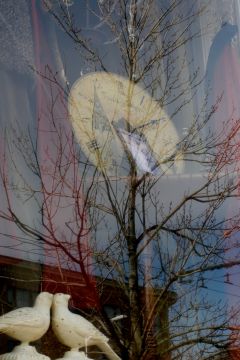December 09, 2005
Avian flu - Two Birds with One Stone

Just when we didn't need any more reasons to want to immigrate to Canada, Helen Branswell, flu reporter extraordinaire, writes about a new Canadian ethics report outlining the difficult decisions that will have to be considered if there is a pandemic.
"The report lays out four key issues the authors think require an ethics-based debate: the duty of health-care workers; the use of liberty-restricting measures like quarantine; the implementation of international travel bans and the setting of priorities for rationing scarce medical resources such as antiviral drugs."
Although I'm personally of the school that it's better to think about issues that many arise beforehand, Dr. Alison McGreer, head of infection control at Toronto Mt. Sinai is quoted:
"'People know if they get in the situation where the decisions will have to be made, they'll have to be made. But to overtly have a discussion ahead of time about making them? . . . The general response up till now among health-care workers is that people really don't think they can do that.'
She's not certain the public wants to contemplate the scenario underlying the tough choices either, noting a rising chorus of criticism that those warning of the dangers of a pandemic are being unduly frightening.
'It's hard to have these discussions without being scary,' said McGeer."
Yes it is. And the report continues:
"The duty of health-care workers to provide care is a key area that needs clarification, according to the report, which raises a spectre few planners like to acknowledge but many fear - the prospect of some health-care workers refusing to work during a pandemic.
It happened during SARS, Upshur [one of the authors] admitted. While many hospital workers performed heroically, some overtly refused to treat SARS patients or 'distanced themselves from engagement.'
'The distribution of risk was by no means equitable within health-care institutions,' Upshur said.
The report notes that after the devastating Spanish Flu pandemic of 1918-19, the Canadian Medical Association wrote into its code of ethics that 'when pestilence prevails' doctors have a duty to 'face the danger . . . even at the jeopardy of their own lives.'
That code has since been rewritten. And there is a general lack of guidance from the organizations governing the medical professions as to how far the 'duty of care' extends, the report warns. "
On a slightly different note, some enterprising Canadian flu watchers on CurEvents dug up old newspaper clippings from thirteen days at the beginning of the 1918 Spanish Flu epidemic which show the breakneck speed at which the the illness spread, and the rapid decline of circumstances. If you click and scroll all the way down through bits of discussion to the very end, you will see how profoundly things changed from October 2 until October 15.
In general, Canadians seem to be thinking much harder, and more constructively about this problem than Americans. I have noticed that thinking is quite out of fashion down here -- besides it gives you wrinkles.
Mike Wallace was recently asked what question he would put to our Number One Nonthinker, should he ever be granted an interview. Wallace answered:
" What in the world prepared you to be the commander in chief of the largest superpower in the world? In your background, Mr. President, you apparently were incurious. You didn't want to travel. You knew very little about the military. . . . The governor of Texas doesn't have the kind of power that some governors have. . . . Why do you think they nominated you? . . . Do you think that has anything to do with the fact that the country is so [expletive] up?
Photo note: The birds, the clock, the photo of a dead relative and the church steeple -- metaphorophotographically, we could probably construe it to mean something, if we thought about it..